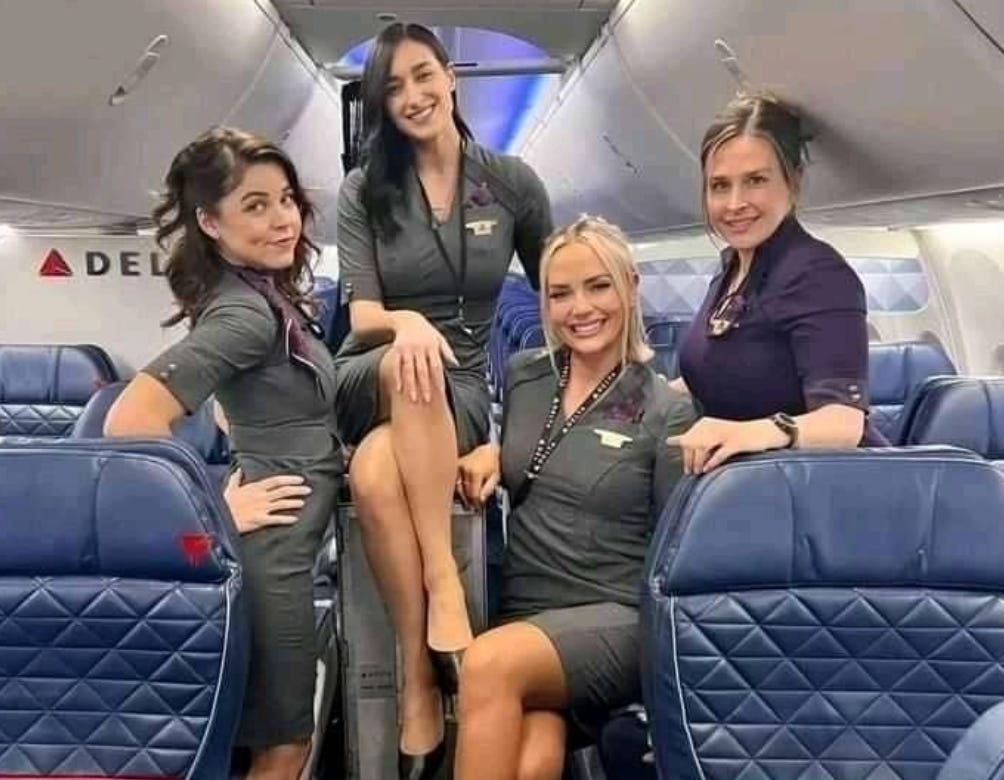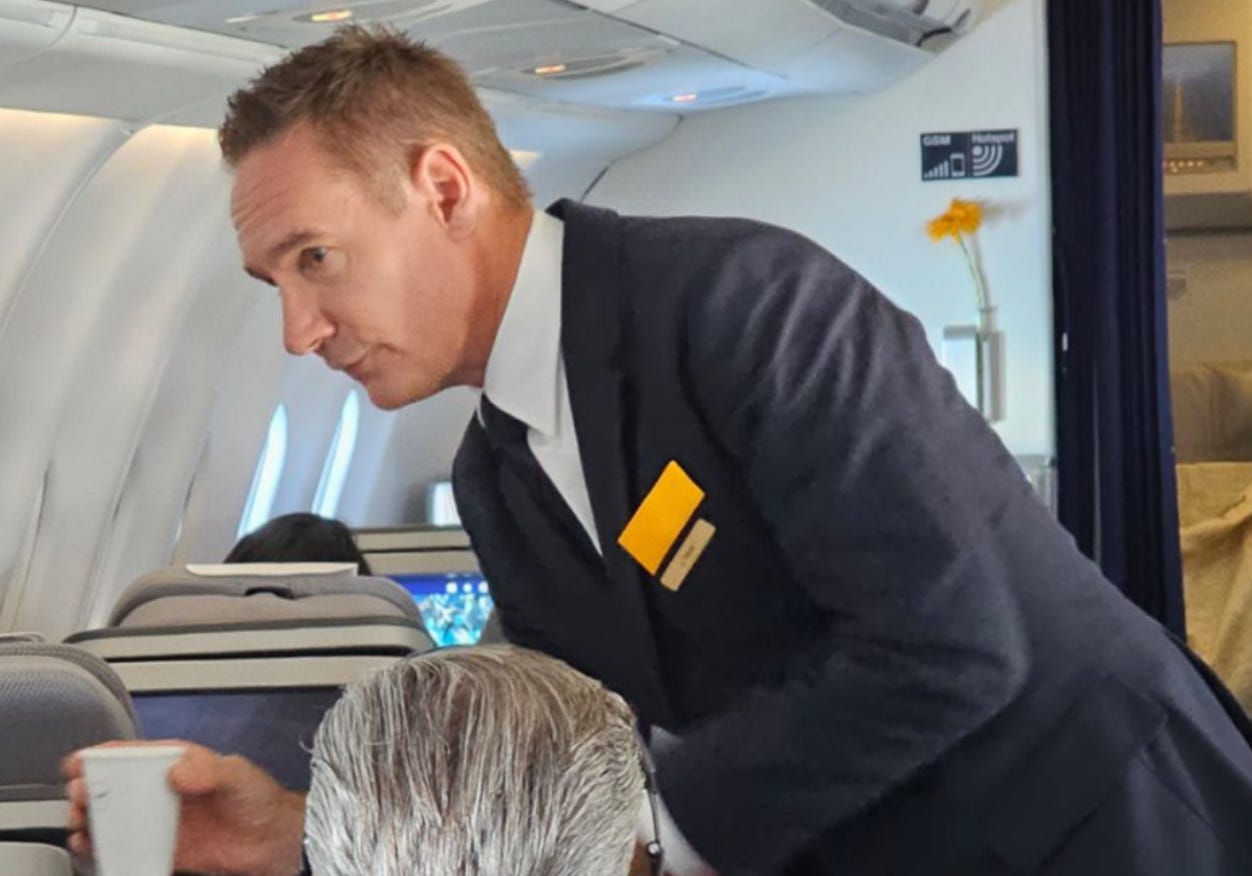MAKICHUK: What exactly, does an airline flight attendant do?
And do they deserve better pay and benefits in the new, post 9/11 jet age?
There’s nothing like the smile, of a flight attendant, as she brings your meal, your drinks, a bottle of water, peanuts, or whatever.
It makes your trip, so much better, doesn’t it?
It can mean the difference from a hellish flight — no legroom, and long hours of sheer boredom — and, one that is tolerable.
I have to admit, the best flights I’ve been on, have been with Turkish Airlines.
Brand new airplanes with great entertainment systems, good food, and, friendly flight attendants.
Man oh man, what a difference that makes.
And I’m talking about Air Canada, folks. The People’s Airline.
We all have stories, and many of them are bad.
The issue is front and centre, because of the Air Canada flight attendant strike.
But hold on a second. Let’s just examine, what flight attendants do.
It’s not an easy job.
Anybody … and I mean anybody … who has has to deal with the general public in their work, knows what I mean.
So, let’s examine what an FA does.
Flight attendants — particularly women — were subject to strict appearance standards throughout the beginning of the jet age to the mid-1990s. Many airlines said this lured in high-paying travellers and created an elevated brand.
Stewardesses, as they were called then, couldn't be too tall or too short, too old or too young. They couldn't be heavy-set — and they had to be unmarried and childless. In the 1970s, Southwest Airlines, for example, fitted its flight attendants in hot pants and gogo boots.
Thankfully, and rightfully, that has shifted to safety and service. And equal pay for stewards and stewardesses.
Fight attendant Betty Ma, told the Business Insider, that it was an eventful career, at first.
“I had amazing flights, for weddings, bachelorette parties, a passenger who beat cancer, but I also had some where we were carrying home a fallen soldier or someone's relative who passed away.” she said.
“(But) there were times when I'd sit in my jumpseat after a long day and wonder, "What in the world am I doing here? Is there something out there where I could be more creative and find more meaning?"
“It got tiring going through the motions of boarding, getting the galley cart out, doing service, deplaning. I felt like a dandelion puff kind of floating from destination to destination.”
She would quit, and go onto a different career.
Look, FAs are the unsung heroes of the airline industry.
Pilots may get you where you're going safely, but everyone knows that attendants are the serious muscle behind in-flight operations.
Whenever I complained about things at the SUN, my boss, Jose Rodriguez, would say: “Maje (my nickname), you’re not nailing shingles, on roofs, at -25C.”
I got the message. Loud and clear.
However, there are still some pretty strict standards in place to land a spot within this in-demand profession.
Requirements vary by airline, but for instance at SkyWest, flight attendants can't have visible tattoos, outlandish hair styles (including colour) or excessive piercings.
Candidates must be tall enough to manage the overhead bins, but still short enough to comfortably perform tasks on the aircraft — generally between 5 and 6 feet in height.
Attendants should also be able to handle a reasonable amount of physical exertion (walking, closing heavy doors and pushing beverage carts) and be physically able to be fastened into a jump seat, which features a shoulder harness and seat belt.
You don’t have to be Barbie, but it doesn’t hurt either.
From a customer service perspective, the goal is to keep passengers as happy as possible despite the ever-shrinking legroom, seats, and food and beverage options available to ticket-holders.
Often, they're crabby before they even board, making it even more important for flight attendants to flaunt excellent customer skills.
"People used to get excited when they went on a trip," recalls Kate Linder, a flight attendant with United Airlines. "Now going through the airport is such a hassle that by the time they get through security they're exhausted."
Been there, done that.
The travel benefits for flight attendants are notoriously awesome, with free and reduced flights available to employees, immediate family members and sometimes even friends and extended kin.
There are flight attendants who regularly pop over to exotic locations just because they can, and workers on international flights sometimes enjoy significant layovers, during which they can sightsee and socialize with the locals.
"We've learned that the tiniest cities are just as much fun as the big hubs because there's always something to discover," says Candy Bruton, a 43-year vet.
Although most flights go off easily enough, the occasional passenger makes life tougher on flight attendants.
Some can even be violent. You just never know, what a passenger will do, especially if they have had a few drinks at 30,000 ft ASL.
FAs have even had to wrestle passengers trying to open an aircraft door during flight.
Kudos to German carrier Lufthansa CEO, Jens Ritter, who decided to try it out for himself.
Ritter became a supernumerary or “additional crew member” on a recent flight to Riyadh in Saudi Arabia and Bahrain.
Describing his experience as a member of cabin crew, Ritter said he went into flight thinking that his extensive experience as a pilot already gave him a good understanding of what flight attendants do … how wrong he was.
“I have been working for the Lufthansa Group for many years. But I have never had the opportunity to work as part of the cabin crew. And honestly, that was so interesting and also challenging,” Ritter said.
“I was amazed by how much there is to organize, especially, if something doesn’t go as planned – for example, the meals offered on the menu cards were not exactly the meals loaded on board.”
Ritter has been the CEO of Lufthansa Airlines since April 2022, but he started off his career as an Airbus A320 pilot in Munich 23 years ago.
“I used to fly as a pilot and so I thought I knew about the challenges a flight during the night entails. But to be present and attentive and charming — when the biological clock just tells you to sleep — was something entirely different,” he continued.
“It was so interesting to address the guests’ wishes individually, to deal with the different energy everyone has.”
On the outbound flight, the 50-year-old CEO helped the cabin crew in the Business Class cabin, but on the return night flight home, Ritter says he got to experience working in the Economy cabin for the first time.
“I was astonished how much I learned in these few hours. Deciding things in the office will be different after really feeling the decisions on board. Thank you to the amazing crew, the lovely guests and everyone involved for making this experience possible,” Ritter said in his post.
Passengers also sometimes have the wrong idea about FAs.
“A lot of people think we’re their waiters and that we’re there to make sure they get drinks and food, but they don’t realize that we’re there to actually save their lives in case something happens,” Delta FA Niguel Modeste said in an interview.
FAs have to be prepared for anything: a fire, a terrorist, an irate passenger or even a medical event.
Or when I had too many margaritas at Chili’s in YYC, and almost passed out on an Air Canada flight to YYZ.
A kind male FA came to my rescue, with water and pretzels, and even took my oxygen level with some kind of device that fits on your finger.
He fussed over me the entire flight! Told me to never do that again, LOL.
But perhaps the biggest part of the job that sucks, is missing quality time at home. This can be tough on people.
Said one FA: “The hardest part of my job is being away from my children more than I want to be at times and missing holidays or special events. I’m missing my son’s 18th birthday today, but my kids are used to that.
“They know that holidays like Christmas may not be celebrated on Christmas. It might be celebrated on Christmas Eve.”
At the end of the day, the pros outweigh the cons, Delta FA Melissa Pittman says:
“Even on my toughest, most challenging days with reroutes, mechanicals, weather delays, medical diversions, challenging passenger interactions or any other job related issue, I still love my job and would not trade it for anything.”
— with files from Lufthansa and Business Insider


